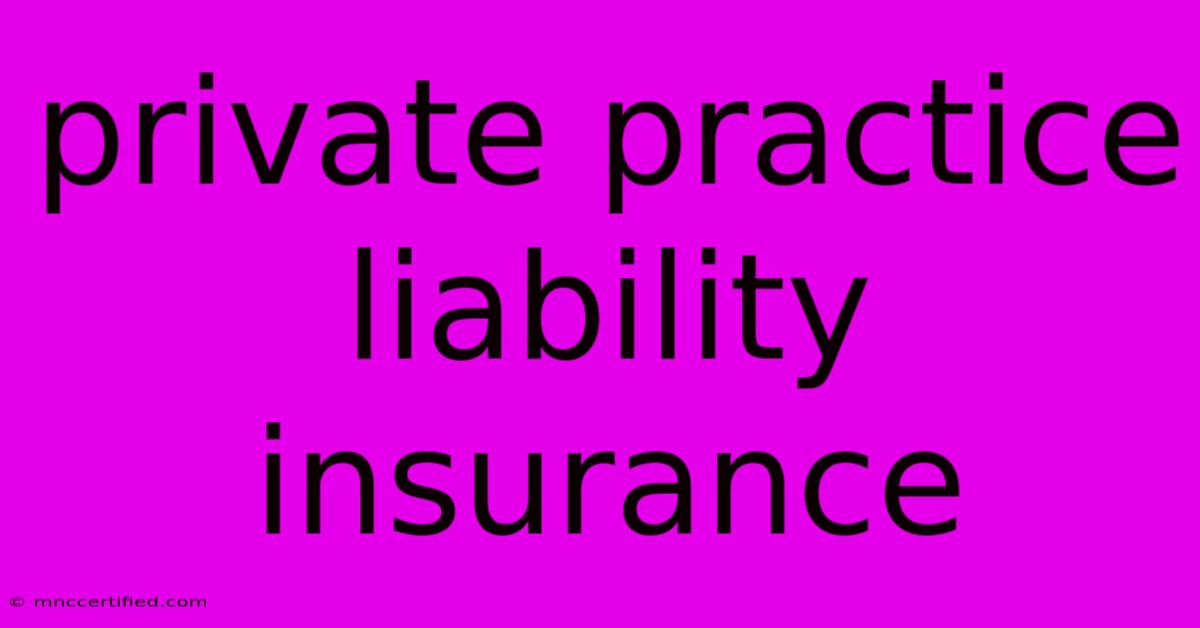Private Practice Liability Insurance

Table of Contents
Protecting Your Practice: A Guide to Private Practice Liability Insurance
Starting a private practice is a rewarding endeavor, but it also comes with its share of risks. One of the most crucial steps in safeguarding your practice is securing adequate liability insurance. This comprehensive guide will delve into the intricacies of private practice liability insurance, explaining its importance, different types, and key considerations for choosing the right coverage.
Why Is Private Practice Liability Insurance Essential?
Private practice liability insurance acts as a financial safety net, protecting you from potential financial losses arising from claims of negligence, malpractice, or other professional misconduct. It shields you from:
- Lawsuits: In the event of a lawsuit, liability insurance covers legal fees, court costs, and potential settlements or judgments.
- Financial Ruin: A successful lawsuit against your practice could bankrupt you, rendering you unable to continue your profession.
- Reputational Damage: A lawsuit, even if unfounded, can negatively impact your reputation and harm your practice's standing within the community.
Types of Private Practice Liability Insurance:
While the specific types of coverage vary depending on your profession, here are some common types:
1. Professional Liability Insurance (Malpractice Insurance): This is the cornerstone of liability insurance for most professionals. It covers claims of negligence, errors, and omissions in the performance of your professional duties.
2. General Liability Insurance: This broader coverage protects you from claims of property damage, bodily injury, or personal injury caused by your practice's activities. It's particularly important for practices that involve physical interactions with clients or operate out of a physical space.
3. Products Liability Insurance: Relevant for practices that sell or distribute products, this coverage safeguards you against claims arising from injuries or damages caused by the products you offer.
4. Cyber Liability Insurance: In today's digital age, this coverage is essential for protecting your practice from data breaches, cyberattacks, and other online security threats.
5. Employment Practices Liability Insurance: For practices that employ staff, this coverage protects you against claims of discrimination, harassment, wrongful termination, and other employment-related issues.
Choosing the Right Coverage:
Selecting the right private practice liability insurance requires careful consideration:
1. Your Specific Needs: The type and level of coverage you need will depend on your profession, practice size, services offered, and risk profile.
2. Policy Limits: This refers to the maximum amount your insurer will pay for a covered claim. Ensure your policy limits are sufficient to cover potential financial losses.
3. Deductible: The deductible is the amount you pay out of pocket before your insurance coverage kicks in. A higher deductible typically results in lower premiums, but you should choose a level you can comfortably afford.
4. Claims History: Your past claims history can influence your premium rates. Practices with a history of claims may face higher premiums.
5. Exclusions: Be aware of any exclusions within your policy, such as specific types of claims or situations that are not covered.
6. Insurance Broker: Working with an experienced insurance broker specializing in private practice liability insurance can be invaluable. They can help you assess your needs, compare policies, and negotiate favorable terms.
Maintaining Your Coverage:
Once you have secured adequate liability insurance, it's crucial to maintain it:
- Renew Regularly: Ensure your policy is renewed on time to avoid gaps in coverage.
- Review Regularly: Periodically review your policy to ensure it still meets your evolving needs and risk profile.
- Notify Your Insurer: Inform your insurer of any significant changes in your practice, such as new services or employees, as they can affect your coverage requirements.
Conclusion:
Securing the right private practice liability insurance is an essential step in protecting your practice from financial and reputational risks. By understanding the different types of coverage, choosing the right policy, and maintaining your coverage, you can build a strong foundation for a successful and secure future.

Thank you for visiting our website wich cover about Private Practice Liability Insurance. We hope the information provided has been useful to you. Feel free to contact us if you have any questions or need further assistance. See you next time and dont miss to bookmark.
Featured Posts
-
Aegon Self Invested Personal Pension
Nov 12, 2024
-
Jerry Jones Sun Rant A Fair Take
Nov 12, 2024
-
Mc Tominay Continues To Shine For Napoli
Nov 12, 2024
-
Benny Blanco Reveals Selena Gomezs Botanical Garden Date
Nov 12, 2024
-
Wild Turkey 17 Year Bottled In Bond
Nov 12, 2024